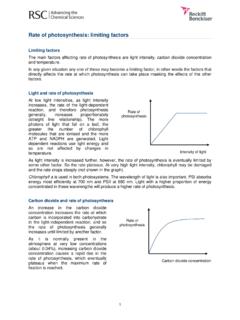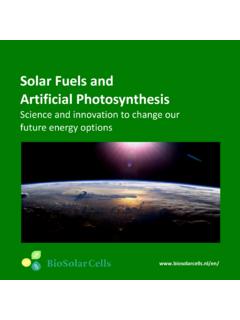Transcription of Solar Fuels and Artificial Photosynthesis
1 Solar Fuels and Artificial PhotosynthesisScience and innovation to change our future energy optionsJanuary | Solar Fuels and Artificial PhotosynthesisAbout this publicationThis report is intended for an audience of policy makers with interests in the UK s future energy strategies, and in UK and EU research and innovation policy. It is a non-technical introduction to the potential of Solar Fuels to become a viable alternative in our future energy RSC is committed to raising awareness of the role of chemistry in addressing global challenges and it is hoped that the report will be of interest to the wider public. About the RSCThe Royal Society of Chemistry is the leading society and professional body for chemical scientists. We are committed to ensuring that an enthusiastic, innovative and thriving scientific community is in place to face the future. The RSC has a global membership of over 47,500 and is actively involved in the spheres of education, qualifications and professional conduct.
2 We run conferences and meetings for chemical scientists, industrialists and policy makers at both national and local levels. We are a major publisher of scientific books and journals, the majority of which are held in the RSC Library and Information Centre. In all our work, the RSC is objective and impartial, and we are recognised throughout the world as an authoritative voice for chemistry and chemists. The RSC and sustainable energyThis report is supported by a wide range of ongoing RSC activities to advance renewable energy technologies, through chemistry and other sciences. For more information on the RSC s many activities in this area, including scientific publishing, international conferences and meetings, and policy activities, see Appendix C and the RSC s online portal for Sustainable Energy. Science and innovation to change our future energy options | 1 TAble oF ConTenTS Foreword 2executive summary 3 Introduction 4 Part 1: The potential of making Fuels using sunlight 5 What are Solar Fuels ?
3 5 How would Solar Fuels change future energy options? 6 A way to store and transport Solar energy 6 A way of producing renewable liquid Fuels for transport 7 A source of renewable Fuels for established industries 8 Solar Fuels , hydrogen transport and carbon capture 8 Part 2: Solar Fuels : science and innovation 10 Scientific approaches to producing Solar Fuels 10 Challenges in large-scale production of Solar Fuels 11 Research and innovation in the UK 11 UK research 12 UK innovation and industry 12 Research and innovation globally 13 Part 3: opportunities for the UK 15 Research and innovation 15 Research and innovation supporters 15 Intellectual property 16 Capacity building 16 Higher education and research 16 A framework for chemistry education 16 Appendices 17 A other methods of harnessing Solar energy 17 b Scientific advances in Artificial Photosynthesis 18 C The RSC and Solar Fuels 20 References 212 | Solar Fuels and Artificial PhotosynthesisFoRewoRdFor previous generations, the idea that we could use Solar energy to produce electricity or fuel may have appeared as a remote vision.
4 But today, harnessing the power of the sun has become a reality; photovoltaic Solar panels are an increasingly common sight. Scientists are now working towards another great breakthrough: mimicking Photosynthesis , nature s way of making fuel from sunlight, on a commercial human achievement is testament to the determination, creativity and hard work of scientists and engineers, each generation building on the knowledge gained by their predecessors. It s a journey that began in the 19th century with the discovery of the photovoltaic effect , whereby an electric current is produced in a material when exposed to the 20th century, we have made completely unforeseeable breakthroughs, including the discoveries and development of conducting materials which are used in modern Solar cells. This pace of progress continues as chemists work closely with physicists, materials scientists and, more recently, biologists, to lay the foundation for next-generation photovoltaic technologies.
5 Recent scientific breakthroughs mean that, in the laboratory, it is now possible to mimic Photosynthesis and to use sunlight, water and carbon dioxide to produce Fuels . Scientists in the UK have played a key role in these breakthroughs, most notably in developing materials to capture and channel sunlight; deepening our understanding of Photosynthesis ; and discovering new catalysts to make the chemistry possible. This report represents an important step in raising awareness of the potential of producing Fuels from sunlight, so that energy from the sun can be stored and used whenever and wherever it is needed. A future where we could run our cars and factories on clean, sustainable fuel is not just a vision. There is increasing momentum in the global scientific and engineering community to develop the chemistry and technologies that will make Fuels from sunlight to limit the impact we have on our planet. The opportunity to contribute to this global effort by current and future world-leading scientists and innovators is one that no nation can afford to miss.
6 Alan J Heeger Professor of Physics and of Materials Department of Chemistry and Biochemistry University of California at Santa Barbara 2000 Nobel Prize in Chemistry for the discovery and development of conductive polymers Science and innovation to change our future energy options | 3exeCUTIve SUmmARyHarnessing and securing environmentally sustainable energy supplies is one of the key societal challenges the Royal Society of Chemistry has outlined in its roadmap, Chemistry for Tomorrow s World. The chemical sciences have a critical role to play in developing energy solutions that will support society s move from an economy based on fossil Fuels to a more sustainable energy around the world are working towards the goal of developing technologies to harness energy from the sun to produce Fuels for transport, industry and electricity generation. Fuels produced using Solar energy would transform our energy options in the future by providing an alternative to fossil Fuels .
7 The United States, the Netherlands and South Korea have seen recent investment in dedicated programmes for Solar Fuels research and innovation, and there are also renewable energy research centres in China and each country is implementing a different strategy, important elements of the American, Dutch and Korean programmes are that they: f oster interdisciplinary fundamental and applied research by bringing researchers from different subfields together to collaborate; aim to make advances using fundamental research in order to develop commercial prototypes; explicitly include the goals of engaging with established industry and innovation, and maximising business opportunities for each there is considerable research strength in both Solar Fuels and Solar photovoltaics in the UK, a coherent strategy for Solar energy research and innovation is crucial if the UK is to maintain its position in light of international competition. This means that we need to invest in fundamental and applied interdisciplinary research; invest in mechanisms to support the next generation of researchers; protect our intellectual property; and, create a climate that supports innovation and engagement between academia and industry.
8 This report explains the concept of Solar Fuels and their potential to transform our future energy options. It sets out the opportunities for the UK to capitalise on its existing research capabilities and position itself to benefit, both environmentally and economically, from Solar Fuels | Solar Fuels and Artificial PhotosynthesisInTRodUCTIonScientific breakthroughs and new technologies will play a key role in securing a sustainable supply of energy for the UK, and globally, and addressing the risks of climate change and ocean acidification. Sustainable, low carbon energy supplies are one of the most pressing challenges facing society. The need to take immediate action has been underscored by the International Energy Agency s World Energy Outlook 20112 which concluded that There are few signs that the urgently needed change in the direction of global energy trends is underway , and that We cannot afford to delay further action to tackle climate change.
9 Scientists and engineers are needed not only to find more efficient ways of producing, refining and using fossil Fuels , but also to develop renewable energy solutions. The RSC highlighted the major role of the chemical sciences in addressing global energy challenges in its roadmap Chemistry for Tomorrow s World. 3 New and improved sustainable energy technologies will be one way in which nations will be able to deliver on important commitments to emissions targets, such as: the UN Framework Convention on Climate Change and recent agreements made at the UN Climate Change Conference, Durban 2011; and crucial near-term voluntary national pledges to reduce emissions. The goal of this report is to raise awareness of the concept of Solar Fuels and show their potential to become an additional and significant new option in our longer-term energy future. The UK urgently needs a strategy to support the interdisciplinary research, entrepreneurship and industrial partnerships required to maintain a world-leading position.
10 Only then will the UK be in a position to benefit both environmentally and economically from Solar Fuels in the long-term. Other countries have made significant investment and strategic concentration of resources in Solar Fuels research and innovation. There is a risk that the UK will miss the opportunity to capitalise on its capability in this area. Our sun is the champion of energy sources: delivering more energy to the earth in an hour than we currently use in a year from fossil, nuclear and all renewable sources combined. Its energy supply is inexhaustible in human terms, and its use is harmless to our environment and climate. 1 Professor James barber CChem FRSC FRS Ernst Chain Professor of Biochemistry Imperial College LondonScience and innovation to change our future energy options | 5 New technologiesExisting technologies Fertiliser Plastics Pharmaceuticals Synthetic Fuels for transportSunlight is used to split water into hydrogen and oxygenHydrogen and simple carbon-based Fuels are used as raw materials (feedstocks) by many industriesHydrogen is used as a transport fuelFigure 1 Hydrogen (H ) Solar fuelsCarbon-based Fuels such asmethane (CH ), carbon monoxide (CO) and methanol (CH OH)Sunlight is used to produce carbon-based Fuels from carbon dioxide and water.
















